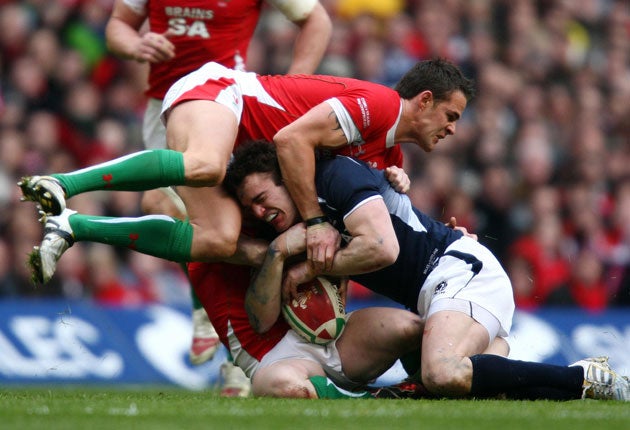David Flatman: If I walk away with my body in one piece, I'll be happy
From the Front Row: We play a dangerous game, putting our heads in dark places every week. Even more reason then for players to be prepared for sport's after-life

Iaccidentally watched a game of lacrosse a few weeks ago; blimey it was rough. All I could think of was teeth being obliterated and shins being cut to ribbons by a swinging stick. Then I got in the car, turned on the radio and heard Phil Vickery had retired from rugby after suffering one neck injury too many and was hit hard by a good dose of perspective. Rugby is a dangerous way to make a living.
It's news to no one, of course, that this game carries a high injury risk, but this does not make it any less of an issue. Just days later, Thom Evans retired, too. These two blokes may be binning their gumshields for the same reason but, actually, their stories are quite different. We have all lived Vickery's career with him, and he has been a hero. We have watched him lock horns for club and country and to be able to say that I played for England with him is one of the great honours. But we have also lived through his injuries – and there have been a few. The number of times he came back from serious, career-threatening knocks to regain his Test jersey is incredible. It makes him a special player and a special man. This time around, though, enough was enough, and we're all just glad to see him walk away from rugby in reasonable working order.
Evans, though, was at the beginning of the sporting journey. I played against him two years ago and, after a nine-try thriller, listened to the boys in the showers heaping rare praise on him as a player. He was young, fearless and quick (I should know: in that game, with five metres to work in, he beat me by about eight metres). Then he got his head in the wrong place and never played again. So in a way his retirement is sadder, for he never had the chance to be all he could be in the game he loved. But – and here's the point – he walks away from rugby and, honestly, that is all many of us wish for. Sure, a mortgage-free after-life would be just spiffing, but a body not in ruination would be nicer.
So why do we do it? Well, rugby was always the game of the educated rough-neck, the worthy pastime for lawyers, bankers and bespectacled graduates. Now, though, there is a new generation on the block: the professional generation. Naturally, at the age of 26, I count myself among them. We finished school and, instead of getting a degree and drinking alcopops at university, chose to hit the gym and become full-time athletes.
It's the lifestyle that makes rugby such an appealing job. On Thursday I got home at 3pm, my latest arrival of the week (and thoroughly put out I was, too), and on Friday I slept in before enjoying a day off. The pay, while not in the same league as football (tone: unattractively jealous), keeps one in nice shoes, and the feeling of being cheered on by thousands of supporters every weekend serves to keep the self-esteem topped up.
But is it all real? For a while, yes. Then, one day, be it through injury or simple sporting evolution, you find yourself staring down the barrel of the real world. The odd player prepares for this day but most do not, so the thud of realisation is a loud one and, while the shock sets in, the hands of one's own mortality grip the throat like a python. The free cars stop arriving, suddenly nobody seems inclined to furnish one's pocket with pink banknotes just for turning up somewhere, and discounted Nando's chicken becomes a distant memory. This, I feel, is why today's rugby player must be forced to prepare.
Next season Dan Grewcock will stop playing and take up his new role as mentor to Bath Rugby's current crop of young guns. He will coach these boys, but not just in the nuances of rugby. His vision is that all of them should be engaging in something constructive once training is finished. He wants these boys to become men and to be ready should injury strike, or should all of their sporting dreams not be realised (and even if they are). I think every club ought to have someone filling this kind of role and, to take it a step further, that perhaps in future it should be written into a player's contract that he must work and achieve off the field. To get this rule passed, the authorities might have to include an X-Box allowance clause in order to prevent more student riots, but it's still worth a thought.
So the message isn't a morbid one. We all know the risks of putting our heads into such ridiculous places but the key is to take them seriously. Let's not be scared, but let's be real. After all, most of us who play our last game on the Saturday will need to have a job by the Monday. Love the life while it lasts but be ready for the next challenge before it arrives. For all his endeavour on the rugby field, you can bet your bottom dollar that Phil Vickery took time to prepare for the day he left the changing room for the last time. His humility and work ethic knew no bounds and they will serve him well in life, as they did in rugby.
Join our commenting forum
Join thought-provoking conversations, follow other Independent readers and see their replies
Comments
Bookmark popover
Removed from bookmarks